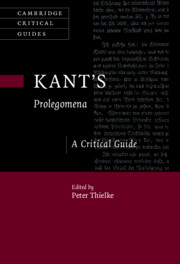Book contents
- Kant’s Prolegomena
- Cambridge Critical Guides
- Kant’s Prolegomena
- Copyright page
- Contents
- Contributors
- Abbreviations
- Introduction
- Chapter 1 Humor, Common Sense and the Future of Metaphysics in the Prolegomena
- Chapter 2 Is Metaphysics Possible? The Argumentative Structure of the Prolegomena
- Chapter 3 From ‘Facts’ of Rational Cognition to Their Conditions: Metaphysics and the ‘Analytic’ Method
- Chapter 4 Transcendental Idealism in the Prolegomena
- Chapter 5 Judgments of Experience and the Grammar of Thought
- Chapter 6 The Beach of Skepticism: Kant and Hume on the Practice of Philosophy and the Proper Bounds of Skepticism
- Chapter 7 The Boundary of Pure Reason
- Chapter 8 Kant’s Argument Against Psychological Materialism in the Prolegomena
- Chapter 9 The Marriage of Metaphysics and Geometry in Kant’s Prolegomena
- Chapter 10 Kant’s ‘As If’ and Hume’s ‘Remote Analogy’: Deism and Theism in Prolegomena §§57 and 58
- Chapter 11 Cognition by Analogy and the Possibility of Metaphysics
- Bibliography
- Index
- Cambridge Critical Guides
Chapter 7 - The Boundary of Pure Reason
Published online by Cambridge University Press: 08 October 2021
- Kant’s Prolegomena
- Cambridge Critical Guides
- Kant’s Prolegomena
- Copyright page
- Contents
- Contributors
- Abbreviations
- Introduction
- Chapter 1 Humor, Common Sense and the Future of Metaphysics in the Prolegomena
- Chapter 2 Is Metaphysics Possible? The Argumentative Structure of the Prolegomena
- Chapter 3 From ‘Facts’ of Rational Cognition to Their Conditions: Metaphysics and the ‘Analytic’ Method
- Chapter 4 Transcendental Idealism in the Prolegomena
- Chapter 5 Judgments of Experience and the Grammar of Thought
- Chapter 6 The Beach of Skepticism: Kant and Hume on the Practice of Philosophy and the Proper Bounds of Skepticism
- Chapter 7 The Boundary of Pure Reason
- Chapter 8 Kant’s Argument Against Psychological Materialism in the Prolegomena
- Chapter 9 The Marriage of Metaphysics and Geometry in Kant’s Prolegomena
- Chapter 10 Kant’s ‘As If’ and Hume’s ‘Remote Analogy’: Deism and Theism in Prolegomena §§57 and 58
- Chapter 11 Cognition by Analogy and the Possibility of Metaphysics
- Bibliography
- Index
- Cambridge Critical Guides
Summary
The chapter takes up the question of how and why Kant marks the limits of metaphysics, particularly in light of the skeptical challenges to reason’s use raised by Hume and Bayle. Here Kant’s distinction between our cognitive faculties – the heterogeneity thesis – plays a crucial role, since it allows Kant to set the boundaries of metaphysics at the cognizable, which requires sensible content that dogmatic metaphysics is unable to provide. Kant’s account of limits and boundaries bears a suggestive similarity to the claims Wittgenstein makes in the Tractatus, and the essay lays out some of the fruitful ways in which the latter work can help shed light on Kant’s argument in the Prolegomena.
- Type
- Chapter
- Information
- Kant's ProlegomenaA Critical Guide, pp. 133 - 153Publisher: Cambridge University PressPrint publication year: 2021
- 1
- Cited by

